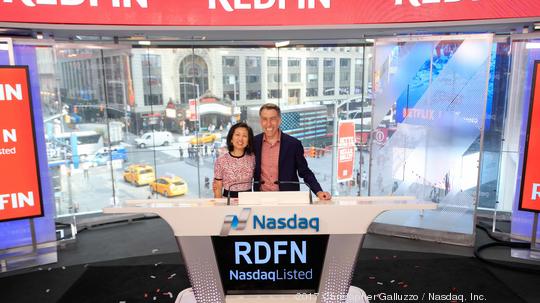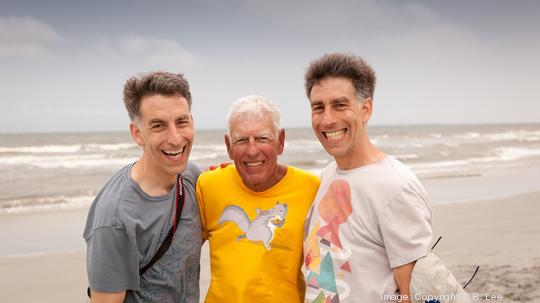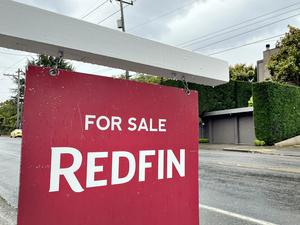Glenn Kelman’s path to Redfin Corp. (Nasdaq: RDFN) began with a phone call he received in 2004 while in the basement of a Chinese restaurant in San Francisco.
The call wasn’t from an investor, entrepreneur or former business contact. It was Glenn’s brother Mark. He was dying of cirrhosis after years of drug and alcohol abuse. Despite a long estrangement from Mark, Glenn left his job at Plumtree, a software company he founded in 1996, and started traveling to Portland to take care of his brother, swapping his place in the flashy world of Bay Area startups for daytime TV with Mark, just to be there for him.
“He was really sick. We went to the emergency room all the time, so often that we would argue about whether to go to the emergency room that was a little further because the food was better,” Glenn Kelman said. “I was always trying to tell (doctors) what a great person he was and that he was worth the effort, but I never had to. They always worked so hard on him.”
Mark died in August of 2005. Glenn, who had been working on a book, decided he needed to get a new job and was attracted to a 3-year-old Seattle startup that showed for-sale houses on a digital map. The then-novel technology impressed Kelman, and his tech background eventually landed him the job as Redfin’s CEO.
Over 16 years later, Kelman has transformed the glorified map company into a tech-heavy real estate brokerage powerhouse, complete with brokered listings, mortgages and direct homebuying. He faces the difficult task, however, of staying true to his values while running a publicly traded company in the competitive worlds of real estate and tech.
“He’s brought himself to the corporation without being changed by some kind of big-shot CEO culture,” said Wes Kelman, a lawyer in Boston and Glenn’s twin brother. “He comes to my house and stays at my house and will ride a bicycle to a business meeting so he can save money for Redfin but also just because he likes it.”

The Path Ahead
Kelman, the Business Journal’s 2021 Executive of the Year, has guided Redfin through drastic changes in the housing market since the start of the pandemic. The wiry 50-year-old, with a touch of gray in his hair and an omnipresent smile, has also guided the company into new ventures. Redfin is expanding its services to include a marketplace for rental listings, made possible by the company’s acquisition of RentPath this year. With RentPath, Redfin can reach more consumers, as well as reach them younger. The move also helps Redfin become a more middle-class product, Kelman says, as buying a home has become more of a luxury.
Making the most of RentPath, however, will likely require lots of work and money. RentPath filed for Chapter 11 bankruptcy in February of 2020 and was almost acquired by its competitor CoStar Group before the FTC sued to block the deal. CoStar already has a rental marketplace with Apartments.com, raising anti-competition concerns. Kelman said Redfin and its board are aware the purchase price is only the start of the investment required for Redfin to become a rental destination. Redfin Chief Growth Officer Christian Taubman told the Business Journal earlier this year that the company aims to have rentals available in March.
One of Kelman’s top priorities is feeling morally whole while operating in industries that face ethical challenges. The real estate industry, with its history of redlining, has long been fraught with systemic injustices. The world of tech, meanwhile, faces a lack of diversity that has caused many to question whether it can actually deliver on visions of inclusion.
At the beginning of the pandemic, despite Kelman giving up his salary, Redfin laid off about 7% of its staff and furloughed an additional 34%. But by May 2020, the company had already started bringing some employees back.
According to SEC documents, Kelman made $63,609 in 2020, roughly the same amount as the median employee at Redfin ($63,375). His compensation was the lowest of any Washington public company CEO in 2020, according to Business Journal research, and he didn’t take home a salary after March 17.
Kelman knows there are important problems facing the real estate industry. For one, being an agent often requires having a network to find clients and get started. Starting out as an agent also could mean months without sales or an income, so agents often need a big bank account as a safety net during the early days.
Both requirements, Kelman adds, can create barriers to entry for underrepresented groups and are a major reason why Redfin pays its agents a salary with benefits.
Sometimes the best interest of the company and the morally right thing are more at odds. Redfin used to pocket listings, a move Kelman describes as “straight out of the unicorn playbook” where companies will make sure the only way to find its listings is through its own platform. Companies like Uber and Airbnb, for example, have become so valuable because they’ve worked to have more rides or places to stay on their sites than competitors.
But the practice is more distasteful in real estate, Kelman says.
When he met with a fair housing advocate, Kelman asked how Redfin could become more equitable, and she said the company needed to stop pocketing listings, as consumers shouldn’t be excluded from finding a home if they don’t know about Redfin. Kelman said pocket listings were foundational to Redfin’s success and asked what were numbers two, three and four on her list. When she said pocket listings were numbers one through four, Redfin eventually decided to stop pocket listings.

By the numbers
Redfin posted impressive numbers during its third quarter 2021 earnings, which were released in early November. Here are the highlights:
- $540M: total revenue for the quarter
- 128%: the year-over-year increase in revenue for the quarter
- $127M: gross profit for the quarter
- 37%: the year-over-year increase in gross profit for the quarter
- 49.1M: average monthly visitors to Redfin's app and website during the quarter
A Matter of Life and Death
Kelman went to college at the University of California, Berkeley and emerged a “Berkeley hippie” (as he puts it) who embodied the early mindset of tech being a more enlightened form of capitalism. After working as a San Francisco bike messenger out of college, Kelman entered the startup world, eventually founding Plumtree, which made early versions of corporate intranets.
Plumtree grew to hundreds of employees and went public on the Nasdaq in 2002. The company was acquired in 2005. Bridget Frey, now Redfin’s chief technology officer, was an early employee at Plumtree, her first job out of college. She remembers Plumtree employees having barbecues near San Francisco’s Dolores Park, but the company also received invites to lavish dot-com era parties that epitomized a sort of obscene excess before the crash.
“That’s what really stands out to me about that era,” Frey said. “Just the vast openness where it was like anybody can come here and share in the food and drink and entertainment. They almost had no interest in whether you could actually become a customer.”
The experience may have left its mark on Kelman, who set out to build something more practical with Redfin. He calls tech that is not connected to the real world “unbearable” and worries tech, for all its early promise, can become just as amoral as other industries. The real impact of a company like Redfin, Kelman says, is the importance of its services. A home is a stepping stone for generational wealth, security and a better lifestyle.
His early days with Redfin were bumpy. For starters, Kelman almost didn’t get the job. Paul Goodrich, managing director at Redfin’s early investor Madrona Venture Group, was charged with finding a leader for Madrona’s young portfolio company. He passed on Kelman, who self-sabotaged by telling Goodrich he planned to eventually go to medical school, as his experience with Mark had left such an impression that he almost felt like going back into business was a cop-out.
When Goodrich’s first choice for the Redfin CEO role started negotiating severance pay before taking the job, Goodrich decided Kelman might be a better fit after all, even if his medical school plan could throw a wrench into the company’s ambition. And it almost did.
Kelman applied to medical school and was accepted at the University of Washington in 2006. He even sent in an acceptance letter. But after wrestling with his soul and shadowing doctors, he decided to stay in the business world, making a promise to his wife, Sylvia, that doing good would remain more important than making money.

The decision was made, except he had already sent the acceptance letter to UW. Kelman had to beg to get the letter back from the postal center, which only happened after he insisted it was a matter of life and death.
“When I finally told the dean at the University of Washington medical school, the dean of admissions recommended that I get medical counseling and that I had some kind of psychological problem,” Kelman recalls.
Starting from scratch
Even if business can be “fun,” as Kelman puts it, getting Redfin to where it is today has been hard work. As Goodrich puts it, Redfin started out as a cool technology company that didn’t have much of a business plan.
“We were basically starting from scratch,” Goodrich said. “We didn’t have a marketing strategy. We didn’t have much of anything to begin with.”
Kelman and the three-person Redfin team worked out of Dave Eraker’s apartment in Capitol Hill near 10th Avenue East and Aloha. The company’s computers all sat in a living room without air conditioning, and anyone taking a call had to do so outside in the stairwell landing.
The company initially wanted to make the real estate process more self-service, where homebuyers could handle most of the process on their own with Redfin’s technology. Customer service was viewed as a bug and not a feature, Kelman says. Over time, however, Redfin realized consumers wanted human interaction and someone to help them along the journey, which led to the company adding its own agents.
For all of his warmth, Kelman shouldn’t be thought of as passive. Goodrich describes Kelman as ferociously competitive. He is a strategy game fan, and as Frey puts it, he gets grumpy when he loses at Settlers of Catan. The mindset translates over to business, where Kelman is intent on making Redfin as successful as possible. Goodrich, himself a co-founder and 26-year veteran at arguably the most prestigious venture capital firm in the Pacific Northwest, says Kelman works “unbelievable” hours, and Goodrich had to convince Kelman to stop working so hard to avoid burnout.
Given the many tales of Kelman, it’s likely the advice fell on deaf ears. Goodrich points to an instance when Kelman and Sylvia had planned a week-long vacation to Europe. Instead of flying straight to Europe, however, Kelman and his wife stopped in Chicago on the way to run the Chicago marathon on Sunday morning before crossing the Atlantic Sunday night.
Kelman once promised his team he would climb Mount Rainier. As the story goes, Goodrich remembers, Kelman landed in Seattle one evening after an East Coast business trip, drove straight to the trailhead and slept in his car. He started climbing Rainier the next day.
“He’s sort of the classic lead by example,” Goodrich says. “It’s a hard example to follow in many respects.”
Reluctant, gradual expansion
Athletic exploits aside, Kelman’s tempered approach has actually paid off for the company recently. While competitors bet big on direct homebuying with the intent to flip and sell the homes, or “iBuying,” Redfin was more cautious about its iBuying business, RedfinNow. In fact, Kelman has been a skeptic of iBuying.
“The hardest thing for me was that I wouldn’t want this product for myself,” Kelman said. “The people running RedfinNow said, ‘Well I have met customers who are not well-served by our brokered listings. They have four kids and a dog. They have to clean up the house every single day. They have anxiety issues, and this whole process is making them miserable.’ So we’re not pitching iBuying. We’re pitching the choice.”
Zillow, one of Redfin’s chief competitors, recently saw its aggressive push into iBuying backfire. In November, Zillow announced it was shutting down its iBuying business, Zillow Offers, and laying off about a quarter of its staff. Meanwhile, RedfinNow is continuing its gradual expansion.
Rather than indulge in schadenfreude, Kelman refuses to gloat when talking about the recent misfortunes of his competitor.
“Obviously we compete,” Kelman says. “We want to drink each other’s blood, but that is a well-run company. (Zillow co-founder and CEO) Rich Barton is a visionary, charismatic, dazzling entrepreneur.”

A man of many talents
Glenn Kelman is best known for his role as the CEO of Redfin, but it's hardly his only hustle. His many talents include:
- Writing—Kelman spent a long time writing a book before taking the Redfin CEO job. In fact, his now-wife's father thought Kelman, who had already founded a publicly traded software company, was a failed novelist down on his luck.
- Mountaineering—After a business trip, as the story goes, Kelman drove straight to Mount Rainier and slept in his car before starting the climb the next morning.
- Running—Kelman and his wife, Sylvia, once completed the Chicago marathon on their way to a vacation in Europe.
- Board gaming—Kelman is a huge fan of Settlers of Catan and doesn't take kindly to losing, according to Redfin CTO Bridget Frey.
Anyone who thinks Kelman’s good nature would make him ill-suited to be a CEO clearly didn’t know him in high school. At Interlake High School in Bellevue, Kelman was nominated for a popularity contest, mostly as a gag that was meant to embarrass him, Wes Kelman remembers. Instead of letting humiliation run its course, Glenn leaned into the joke and even came onstage wearing a male bikini, instantly disarming anyone who thought Glenn would crumble under the lights. He ended up winning the competition.
At a young age, Glenn showed a confidence beyond his years. When Glenn and Wes were 14, their mom got cancer, and although she survived, there was a point when it seemed like she would die, as the chemotherapy had knocked down her immune system.
As Wes remembers it, one morning their mom, the family “alpha” (as Wes puts it), looked extremely sick but refused to go to the hospital, despite Wes and his dad’s suggestions. Wes, dejected after seeing his mom so sick, went back to his room and told Glenn the situation. Teenage Glenn, Wes recalls, marched into his parents’ room and didn’t suggest so much as demand they go to the hospital, giving out orders and refusing to take “no” for an answer.
Wes and Glenn’s mom made it to the hospital. She was unresponsive for days before she barely pulled out of it, Wes says.
“I don’t know why he’s that way. It doesn’t come with any bad qualities,” Wes Kelman says. “If you had asked any of us back when we were in high school which brother is going to be the CEO, not one person out of 100 would have picked me.”








